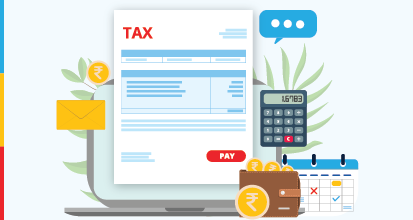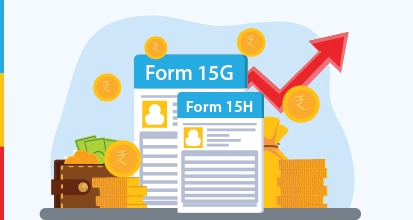Exemption on Capital Gains
The capital gains you make are generally large and attract a tax depending on the asset type, holding period (short-term/long-term), and the transfer date. Thus, the government has introduced various exemptions to lower your capital gains tax liability.
Let's understand with an example.
Akshay purchased land in the year 2000 for a value of ₹10,00,000. Twenty five years later, in the year 2025, he decided to sell it for a whopping ₹1 Cr.
On calculation, his LTCG tax will be:
- Consideration = ₹1,00,00,000
- Cost of acquisition (no indexation) = ₹10,00,000
- LTCG = ₹90,000
- Tax = 12.5%
- LTCG payable = ₹11,25,000 (plus applicable cess/surcharge)
Thus, he now has to pay over ₹11 lakhs for the capital gain he made. But knowing all about income tax, Akshay knew he could bring the amount further down by making use of the exemptions.
These are explained in the section below.
Section 54: Exemption on Sale of House Property for Purchase of Another House Property
The exemption under this section is regarding the profit that you earn on the sale of property that you use for your residence. Under this section, the whole capital gain can be exempt if it is fully utilised.
Eligibility:
- If the capital gain is more than ₹2 Cr, you must purchase another residential property within one year before or two years after you sell the property.
- If the capital gain is less than ₹2 Cr, you have the option of purchasing two residential houses or constructing two residential houses within three years.
- There is a 3-year lock-in period. You can avail of an exemption if you have held the property for at least three years.
Section 54F: Exemption on Sale of Asset other than a Home Property
This exemption comes into play if the capital asset is a long-term capital asset other than a house property. You can avail yourself of this exemption if you decide to invest the net sale consideration in one property. The exemption will be provided to you only if:
- The consideration you receive is invested in a house property one year before or two years after you sell the capital asset.
- Or the consideration that you receive is invested in house property in India within three years of the asset sale.
Notes: If the sale consideration is not utilised by the due date of filing the return of income, the unutilised amount can be deposited in the Capital Gains Account Scheme (CGAS).
If the sale consideration is not utilised by the due date of filing the return of income, the unutilised amount can be deposited in the Capital Gains Account Scheme (CGAS).
Section 54EC: Exemption on Sale of House Property on Reinvesting in Bonds
Every person is eligible for this deduction provided that they have held a long-term asset, i.e., and or building (or both), for more than 24 months. This exemption is available if you decide to invest the capital gain made through the sale of land, buildings, etc., in certain bonds.
Eligibility:
- In a fiscal year, the maximum amount invested in bonds cannot exceed ₹50 lakhs.
- Within six months of selling your property, you should invest the capital gain in bonds.
- The bonds that you invest in must be of a long-term nature and be redeemable after at least five years.
The government has provided a list of the bonds you can buy to avail of this exemption.
- NHAI (National Highway Authority of India)
- Rural Electrification Corporation Limited (RECL)
- Central Government Bonds
Section 54B: Exemption on Agricultural Land Capital Gains
- If you are an individual or part of a HUF and want to sell land that is used for agricultural purposes, then you are eligible.
- Note that the land to be sold must have been used for agriculture-related activities for at least two years before the date of transfer by the assessee, his parents, or HUF.
- You can avail of the exemption if you purchase any other land for agricultural purposes within two years of the sale.
- Capital gain equal to the value of the land can be exempt. (Exemption is the lower of capital gains or investment in new agricultural land, including amount deposited in CGAS.)
- This exemption also has a lock-in period of 3 years.
- If the capital gain is not utilised up to the date of filing the return of income, the unutilised amount can be deposited in the Capital Gains Deposit Account Scheme to claim the exemption
Investing in real estate can help build assets and provide financial protection and stability for the future. Hence, by benefiting from these tax-saving schemes, you can receive the maximum advantage on your property investment.
Section 54D: Exemption for Industrial Land/Building Transfers
For businesses that face compulsory acquisition of industrial land or buildings, Section 54D offers a crucial exemption on capital gains. This exemption aims to support businesses by providing relief when the government acquires their property.
The key conditions for claiming the section 54D exemption are as follows:
The asset must be industrial land or a building that has been in use for business purposes for at least two years before the date of acquisition.
The taxpayer must reinvest the capital gain in acquiring another industrial land or any right in land/building, or construct any other building within three years from the date of transfer.
If the new property is sold within three years, the exempted capital gain is treated as income in the year of sale. (On sale within 3 years, the exemption claimed is deducted from the cost of acquisition while computing capital gains on transfer of the new asset)
Note: If the capital gain is not utilised up to the date of filing the return of income, the unutilised amount can be deposited in the Capital Gains Deposit Account Scheme to claim the exemption.
By strategically reinvesting under this section, taxpayers can effectively manage how to save capital gain tax, ensuring compliance and financial security.











